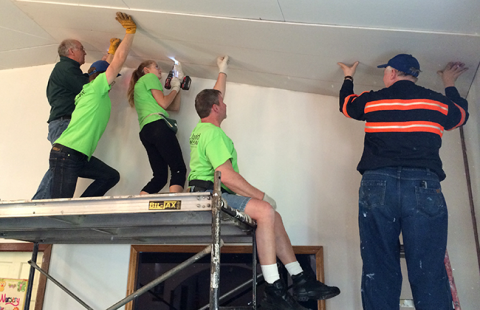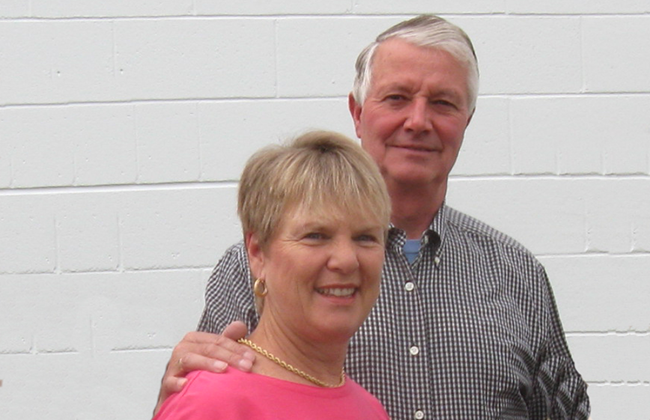As Bruce and Laurie Hawley retire, hybrid disaster response sites build on their work.
Bruce Hawley once spent an hour sitting on a roof in Missouri, explaining to the homeowner why his team of volunteers would want to help tear off the damaged roof and put on a new one. Bruce and his wife, Laurie, were leading disaster response teams following a tornado.
The homeowner asked Bruce how much the help would cost.
“Nothing,” Bruce said. “These are volunteers with the church.”
“Why would they do that?” the homeowner asked.
“We sat up on his roof for an hour and I explained why,” says Bruce. “The message that Christ first loved us and we are called to love others was a new message to him.”
That message has been the core of the Hawleys’ work as RCA mutual mission facilitators. Since 2000, they have partnered with local disaster response sites for months at a time and hosted weekly teams of volunteers.
The Hawleys have bridged a gap that exists in much of the disaster response world. Most disaster response models run into one of two problems: either there’s too much turnover because volunteers can come only for a week, resulting in minimal progress, or the volunteers are limited to those who are able to be gone for several weeks at a time.
But by staying at one site for several months, the Hawleys have provided needed continuity while allowing volunteers to come for just a week. It’s a model the RCA brought to World Renew Disaster Response Services (DRS) a few years ago when the two organizations began working together to respond to disasters.
DRS is the disaster response arm of the Christian Reformed Church in North America. It works to restore homes of vulnerable people in disaster-affected communities. Often, it sends volunteers for years after a disaster, helping people get back on their feet.
The connection with the Hawleys and the RCA is one factor that led to innovation in DRS’s approach: they’re now offering “hybrid” worksites that bring together the best of both worlds—a great experience for volunteers, and high-quality services to homeowners impacted by disasters.
The hybrid sites are overseen by facilitators who, like the Hawleys, can serve for a few weeks. When one set of facilitators leaves, another set steps in, then another, and so on for several months. All the while, teams of volunteers rotate in each week.
One such site was in West Virginia, where Rob and Sharon Schelling served as facilitators for five weeks in early 2016. The Schellings, members of Maurice Reformed Church in Maurice, Iowa, volunteered under the Hawleys and with DRS before being trained as facilitators themselves.

“The benefit of this hybrid site,” says Rob, “is that we have the know-how of what and how to do the work. If anyone is willing to serve or do whatever is needed, we can direct that. … There’s no limit as to who can come.”
Not only does the model allow for a wider range of volunteers who can enter into well-organized work, but it also respects those receiving the help—something that’s long been a hallmark of RCA and DRS disaster response efforts. And it’s efficient.
“The facilitators provide a wonderful service to the local community,” says Art Opperwall, a program manager for DRS. “The local people don’t have to get as involved in the details because we have someone who is skilled in construction who can oversee the work. … With the facilitators there the entire month, they got more done than what the community expected would get done.”
That efficiency leaves more room for relationship: “We came to recognize that the work was the excuse for people to be there and not the reason,” says Bruce. “The reason was the relationships.”
As the Hawleys retire this year, they’re eager to see hybrid site facilitators bring their own strengths. Says Laurie: “Here we can walk away and it will be seamless, so people can follow Christ in mission and help in disaster.”
Celebrate God’s work through the Hawleys and pray for their transition into retirement.
Have space in your schedule? Consider serving as a facilitator. Email volunteer@rca.org.
Only free for a week? Visit www.rca.org/disaster-response to see where you can serve.





